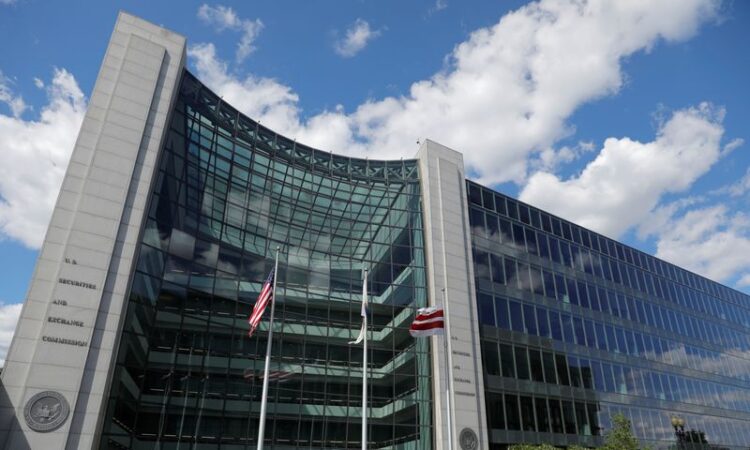
By Jonathan Stempel and Carolina Mandl
(Reuters) -A U.S. appeals court threw out a Securities and Exchange Commission rule intended to give investors more transparency into private funds, handing a victory to the nearly $27 trillion industry.
In a 3-0 decision on Wednesday, the New Orleans-based 5th U.S. Circuit Court of Appeals ruled in favor of six private equity and hedge fund groups, finding the SEC exceeded its authority by adopting the rule in August.
An SEC spokeswoman said the regulator is reviewing the decision and will determine its next steps.
The decision is a fresh blow for the SEC and Chair Gary Gensler, as business groups turn to conservative-leaning courts such as the 5th Circuit to challenge federal rules they say require needless red tape and expense, and amount to overreach.
The rule overturned on Wednesday required fund managers to issue quarterly performance and fee reports, perform annual audits, and stop giving some investors preferential treatment over redemptions and special access to portfolio holdings.
It applied to private equity funds, hedge funds, venture capital funds and managers of funds for institutional investors such as pension funds and endowments, among others.
Industry officials praised the decision, saying the SEC rule was unduly burdensome and costly, and threatened to fundamentally change how they did business.
“The ruling is a victory for thousands of businesses across America that need capital to grow and millions of workers who depend on private equity and credit to strengthen their retirements,” said Drew Maloney, chief executive of the American Investment Council, one of the six groups.
Investor advocates criticized the decision, with Stephen Hall, legal director of the nonprofit Better Markets, calling it a “terrible setback.”
He said the decision deprives ordinary Americans with pension funds of protections from unfair and opaque practices, and weakens the SEC’s ability to protect investors, financial stability and market integrity.
Some hedge fund groups are also suing the SEC over short-selling disclosures and changes to trading U.S. Treasuries, while business groups sued the SEC over climate change rules.
‘NOTHING TO DO’ WITH PRIVATE FUNDS
Private equity and hedge funds typically attract well-heeled, sophisticated investors, and as a result have received less federal regulatory oversight than investments geared toward ordinary investors.
The SEC said the rule aimed to increase transparency, fairness and accountability in an industry known for opacity.
But opponents said it would ultimately hurt ordinary investors who frequently have indirect exposure to private funds through pension and retirement plans.
Circuit Judge Kurt Engelhardt rejected the SEC’s argument that Congress gave it authority through the 2010 Dodd-Frank law to implement the rule.
He said the applicable provision “has nothing to do with private funds.”
Private funds’ assets under management swelled to $26.6 trillion in 2022 from $9.8 trillion a decade earlier, as the number of private funds more than tripled to about 101,000, according to the SEC.
David Blass, a partner at Simpson Thacher & Bartlett, said the decision could have a “pretty significant impact” on SEC rulemaking, including rules on keeping broker-dealers from using technology that could subordinate clients’ interests to their own.
“They’ll take great care and consider this decision, so that they don’t have the same vulnerabilities,” he said, referring to the SEC.
OPPONENTS SAW INVESTOR HARM
Other groups challenging the SEC rule were the National Association of Private Fund Managers, the Alternative Investment Management Association, the Loan Syndications and Trading Association, the Managed Funds Association and the National Venture Capital Association.
They said the rule would harm investors by forcing them to sift through “mountains” of new information to find what they want, and foot nearly $500 million of annual compliance costs.
The groups also said the rule could suppress capital formation, and make it harder for smaller advisers to compete.
In announcing the rule, Gensler said it would benefit “all investors, big or small, institutional or retail, sophisticated or not.”
The SEC voted 3-2 to adopt the rule, with Democratic-appointed commissioners in favor and Republican-appointed commissioners opposed.
All three judges involved in Wednesday’s decision were appointed by Republican presidents.
(Reporting by Carolina Mandl and Jonathan Stempel in New York; Editing by Franklin Paul, Aurora Ellis and Chris Reese)






